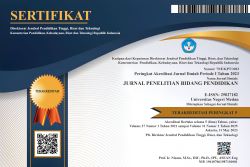PERSEPSI MAHASISWA TERHADAP PEMBELAJARAN BLENDED BERHUBUNGAN DENGAN PENINGKATAN HASIL BELAJAR
DOI:
https://doi.org/10.24114/jpbp.v28i1.32744Keywords:
blended learning, nutritional counseling, student perceptionAbstract
Nutritional counseling is an essential component of nutrition students to be equipped to address nutritional problems. The objective of the study was to analyze the correlation of nutrition students for teaching presence perception in blended learning to improve the learning outcomes of nutritional counseling stages. The study used a cross-sectional research design, nutrition students in nutritional counseling courses completed the 13-item Community of Inquiry (COI) questionnaire for teaching presence. The results showed that students had higher agreement across the level of teaching presence. The findings of this study suggest that perceived teaching presence was significantly related to improving the learning outcomes of nutritional counseling stages.References
Adams, A. and Timmins, F. (2006) œStudents views of integrating web-based learning technology into the nursing curriculum“A descriptive survey, Nurse Education in Practice, 6(1), pp. 12“21.
Akyol, Z., Garrison, D.R. and Ozden, M.Y. (2009) œDevelopment of a community of inquiry in online and blended learning contexts, Procedia-Social and Behavioral Sciences, 1(1), pp. 1834“1838.
Arbaugh, J. ben et al. (2008) œDeveloping a community of inquiry instrument: Testing a measure of the community of inquiry framework using a multi-institutional sample, The internet and higher education, 11(3“4), pp. 133“136.
Curry, K.R. (2000) œMulticultural competence in dietetics and nutrition, Journal of the Academy of Nutrition and Dietetics, 100(10), p. 1142.
Harris-Davis, E. and Haughton, B. (2000) œModel for multicultural nutrition counseling competencies, Journal of the American Dietetic Association, 100(10), pp. 1178“1185.
Henry, B.W. (2007) œUse of the standardized patient model to develop nutrition counseling skills, Journal of nutrition education and behavior, 39(1), pp. 50“51.
Ireland, J. et al. (2009) œBlended learning in education: effects on knowledge and attitude, British Journal of Nursing, 18(2), pp. 124“130.
Kang, J. and Seomun, G. (2018) œEvaluating Web-Based Nursing Education™s Effects: A Systematic Review and Meta-Analysis, Western journal of nursing research, 40(11), pp. 1677“1697.
Law, K.M.Y., Geng, S. and Li, T. (2019) œStudent enrollment, motivation and learning performance in a blended learning environment: The mediating effects of social, teaching, and cognitive presence, Computers & Education, 136, pp. 1“12. doi:https://doi.org/10.1016/j.compedu.2019.02.021.
Li, C. et al. (2019) œThe effects of blended learning on knowledge, skills, and satisfaction in nursing students: A meta-analysis, Nurse education today, 82, pp. 51“57.
Miller, M.E. et al. (2019) œComparing Delivery Methods of an Introductory Nutrition Course Using the Community of Inquiry, Journal of nutrition education and behavior [Preprint].
Pelto, G.H. et al. (2004) œNutrition counseling training changes physician behavior and improves caregiver knowledge acquisition, The Journal of nutrition, 134(2), pp. 357“362.
Sherman, H. et al. (2012) œBlended versus lecture learning: outcomes for staff development, Journal for Nurses in Professional Development, 28(4), pp. 186“190.
So, H.-J. (2009) œIs blended learning a viable option in public health education? A case study of student satisfaction with a blended graduate course, Journal of public health management and practice, 15(1), pp. 59“66.
Xiong, P. et al. (2017) œEffects of a mixed media education intervention program on increasing knowledge, attitude, and compliance with standard precautions among nursing students: A randomized controlled trial, American journal of infection control, 45(4), pp. 389“395.
Downloads
Published
Issue
Section
License
Copyright (c) 2022 JURNAL PENELITIAN BIDANG PENDIDIKAN

This work is licensed under a Creative Commons Attribution 4.0 International License.
Authors who publish with this journal agree to the following terms:
a. Authors retain copyright and grant the journal right of first publication with the work simultaneously licensed under a Creative Commons Attribution License (https://creativecommons.org/licenses/by/4.0) that allows others to share the work with an acknowledgement of the work's authorship and initial publication in this journal.
b. Authors are able to enter into separate, additional contractual arrangements for the non-exclusive distribution of the journal's published version of the work (e.g., post it to an institutional repository or publish it in a book), with an acknowledgement of its initial publication in this journal.
c. Authors are permitted and encouraged to post their work online (e.g., in institutional repositories or on their website) prior to and during the submission process, as it can lead to productive exchanges, as well as earlier and greater citation of published work (See The Effect of Open Access).

